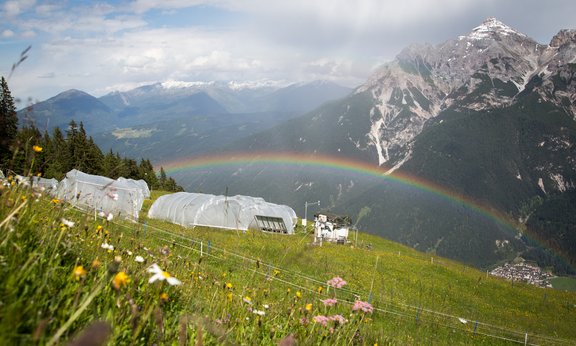For several years, the ecologist Michael Bahn has been working in the field of disturbance ecology, which deals with the question of how systems react to disturbances. Resilience is a key concept in this context. Resilience consists of two aspects. On the one hand, the term describes the ability of a system to minimize the immediate effect of a disturbance; on the other hand, it characterizes the ability to recover from a disturbance and to return to the initial state. Johannes Ingrisch and Michael Bahn from the Institute of Ecology point out that numerous studies have used hardly comparable metrics for the quantification of resilience. In their article, they propose a universal method for a comparative quantification of ecosystem resilience.
A new approach to quantify resilience
In their methodology, they adopt an approach that takes into account both resistance and recovery. First, the initial state of a system, must be defined. The recovery rate and the change in the state or functions of an ecosystem always relate to this starting point of a system. Thus resilience can be compared across multiple disturbances and ecosystems. “With this method, we will be able to determine more consistently which processes are more sensitive and which systems are more susceptible”, explains Michael Bahn. “If you know the initial state, the size of the impact and the recovery rate, you can map every system in our framework and compare it to others”," continues Michael Bahn. An advantage of this approach is that it does not necessarily require new measurement methods or new data and can therefore also be applied to existing datasets and studies.
Building awareness
Until recently, Michael Bahn dealt with resilience processes within different ecosystems, but did not compare them across different systems. The starting point for the recently published article was a study on the resilience of managed and abandoned mountain grasslands in relation to drought events, which the doctoral student Johannes Ingrisch conducted together with Michael Bahn. In order to compare the resistance and recovery rates of these two systems, the scientists were looking for suitable approaches in other studies and experiments. They found various methods and metrics for the quantification of resilience, which, however, led to partly contradictory conclusions. “For this reason, we wanted to raise the awareness that previously published metrics are not fully comparable and do not adequately represent the complexity of resilience" says Bahn.
Societal relevance
Resilience is not only relevant for ecology but also for society.“In times when climate extremes increasingly threaten human well-being and are therefore getting increasing public attention, it is increasingly important to identify which ecosystems are more resistant to extreme weather events and which management measures increase the resilience of the socio-ecological system", emphasizes Michael Bahn.
Links
- Towards a Comparable Quantification of Resilience. Johannes Ingrisch, Michael Bahn. Trends in Ecology & Evolution. 2018. DOI: 10.1016/j.tree.2018.01.013
- Institute of Ecology
- Land Use Alters the Drought Responses of Productivity and CO2 Fluxes in Mountain Grassland. Johannes Ingrisch, Stefan Karlowsky, Alba Anadon-Rosell, Roland Hasibeder, Alexander König, Angela Augusti, Gerd Gleixner, Michael Bahn. Ecosystems. 2018. DOI: 10.1007/s10021-017-0178-0

